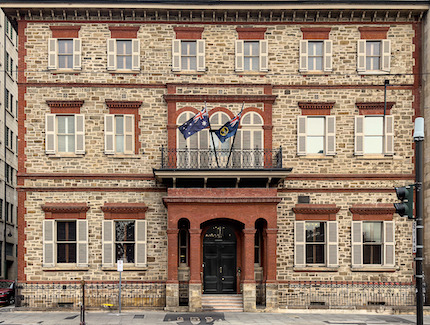Other economics
Remember the “left” right” economic and class divide?

Adelaide Club, once the refuge for the political and economic aristocracy.
Australian political life used to be so simple and predictable. If you went to the right school, if you had a degree in law or medicine, or if you owned a few thousand hectares of land, you voted Liberal. If you had a hardscrabble farm, an orchard or a fishing trawler, you voted for the Country Party. And if you had a job that required you to punch in with a bundy clock, you voted Labor. A few university students were making a fuss about environmental and racial issues, but they would grow up in time.
Peter Temple in his 1996 novel, Bad Debts describes the passing of that class system, when Drew reminds Jack that there is a new economic order:
Jack, I think you’re out of touch. You’re still stuck in the days when the Melbourne Club run this town. All those pompous arseholes who owned factories and insurance companies and played the market. All went to Melbourne Grammar or similar and basically silly buggers who didn’t like Jews or Ities or other kinds of wogs. Their day’s gone Jack. They woke up one day and found the real money was in property development. Residential subdivision. Hotels. Shopping centres. Office blocks. And most of the people making the money didn’t give a shit about joining the club.
Hypocrisy on anti-Semitism
The Coalition’s hypocrisy on anti-Semitism lies in the contrast between its lies about Labor going soft on anti-Semitism and the Coalition’s preference deals with right-wing extremists. Also Bernard Keane reminds us that the Coalition has opposed government efforts to subject Twitter – “now a sewer of open fascism” – to reforms which would see Nazi hate posts blocked: If the Coalition doesn’t like Nazis on Twitter, maybe it should stop legitimising them.
It is now twenty years since David McKnight wrote Beyond right and left; new politics and the culture wars, but we still get surprised when political parties fail to behave in line with those old stereotypes.
Crispin Hull reminds us how much the partisan scene has changed in his post The paradox of recent politics. For example he notes that:
Private-Sector Economic Rationalist Peter Dutton has a plan for massive public ownership of the means of energy production and management with seven nuclear power stations.
Anthony Albanese, the Workers’ Friend, sits on his hands while the big capitalist gaming, sport, and media industries use obscenely aggressive advertising to lure workers in to shovel their pay-packets into poker machines and on to the backs of horses.
He also has some comments on Dutton’s recent hypocritical concern for Jewish Australians.
Hull notes that parties traditionally on the “right” – American Republican and Australian Liberals – have presented concern for climate change and the transition to renewable energy as something confined to left-wing romantics who have little understanding of business. But even since Hull wrote his post, the Business Council of Australia, perhaps the most hard-headed of all corporate lobby groups, is reported to be critical of the Coalition for suggesting it would backtrack on 2030 climate targets.
The nerve of the gambling lobby
The Casino operator Star Entertainment is in deep trouble. At the end of last year it had cash reserves of $80 million. It owes money to the Queensland government for taxes. It is burning through $30 million of those cash reserves each month. The arithmetic is not challenging.
Charles Livingstone, a well-known gambling researcher at Monash University, describes the cause of Star’s trouble in a 7-minute interview on Radio National Breakfast: Calls for governments to aid ailing casinos. Casinos are in trouble because following inquiries initiated by whistleblowers, governments have cut off their two main sources of revenue: money laundering for foreign criminals and exploiting vulnerable people.
So now they come begging for assistance from governments. Unions have joined the plea, pointing out that Star employs 9000 people in its three casinos.
It would be a challenge to ask a student or a consultant to write a case for public support to aid a struggling casino, but as is so often the case, the plea lies in jobs at risk.
There is a defensible argument for helping those 9000 people find new employment, but those jobs don’t have to be in Star Casino, or another casino operator that may buy it in a receiver’s sale. Those people could be found jobs in the real economy, where there is tangible value-added, rather than in the extractive economy where they are now working. And the buildings, including Star’s Queen’s Wharf building, could be repurposed into something useful, such as affordable housing.
Everything you need to know about cryptocurrencies

As banks shut down their ATMs, Bitcoin ATMs are appearing in our cities, particularly in regions with large immigrant communities.
Many people, including our own Reserve Bank Governor, have tended to dismiss cryptocurrencies.
But we have to take cryptocurrencies seriously, because others do. That’s the essential nature of money: once something is accepted as a scarce and easily transferable asset – gold, silver, cowrie shells, tulips, bits of embossed metal, slabs of beer – it is currency.
On Radio National Breakfast – Is this crypto’s big moment? – venture capitalist Mark Carnegie explains all one can about cryptocurrencies in 13 minutes.
There are three categories – Bitcoin, by now well-established, stablecoin – a generic name for a set of cryptocurrencies that are more or less pegged to more traditional assets, and shitcoin – a name he gives to a set of maverick currencies that suck in naïve speculators and give cryptocurrencies a bad name.
He explains the virtue of cryptocurrencies in terms of their traceability – they aren’t particularly suited to money laundering – and their low transaction fees. He’s scathing of the way the bankers’ Swift cooperative is costing the world $150 to $180 billion a year in transaction fees.
He also gives a political history of the origin of cryptocurrencies and blockchain technologies. They were developed by smart people outraged by the way governments used taxpayers’ money to bail out banks during the 2008 financial crisis. And he explains Trump’s monetary policies, as well as anyone can explain any of his behaviour.